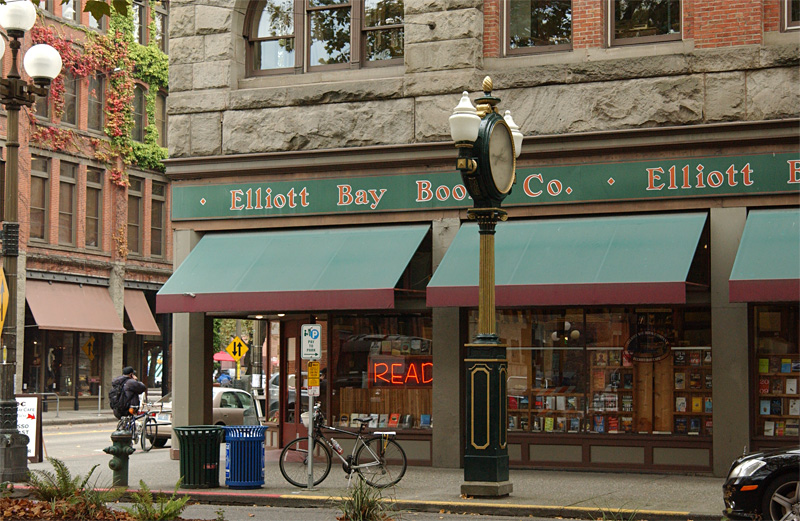Everyone is upset that Elliott Bay Book Co. might move away from its Pioneer Square location, where it’s been for 36 years, to Cap Hill or Ballard or someplace less touristy but with a more manageable rent. As owner Peter Aaron told The Seattle Times, business is way down in our recession economy, he’s got a loan due, and he needs a break on rent from his landlord.
Meanwhile, business is booming at Amazon, which once billed itself as “Earth’s biggest bookstore” and now sells everything under the sun. With the aid of some helpful city rezoning in South Lake Union, and with Paul Allen’s Vulcan as its landlord, the company is preparing to move 20,000 employees out of the ID and the old PacMed Building on Beacon Hill and into 11 spiffy new office buildings served by the shiny new SLUT. (By contrast, the old waterfront trolley tracks leading to Pioneer Square have been gathering rust for years.) Amazon, with a $41 billion market cap, reported a 28% increase in sales for the quarter ending in September.
Thom Chambliss, executive director of the Pacific Northwest Booksellers Association, says Elliott Bay and other single-purpose bookstores are increasingly at a disadvantage. “A huge part of the book business has gone to the big-box stores—Target, Wal-Mart, Costco.” They can draw in customers with a special on cornflakes, toilet paper, or red wine—and right there is a giant pallet of the latest title by Dan Brown, J.K. Rowling, or Malcolm Gladwell. The same economy of scale applies, meaning they can strike better terms with publishers who need to pay top-tier authors huge advances. All those advantages occur online as well.
“That takes away the bestsellers,” Chambliss complains, “and all you’re left with is the backlist, which is harder to sell.” Just last week, the American Booksellers Association sent a letter to the U.S. Justice Department asking it to investigate “predatory pricing” by Amazon, Wal-Mart, and Target, saying they were hawking best-sellers below cost on their Web sites, thereby “devaluing the very concept of the book.” Wal-Mart, Amazon, et al. can afford to sell certain items as loss leaders, says Chambliss. “They’re not worried about making money on books.”
Meanwhile, poor Elliott Bay basically has to make all its money on books, and pay to warehouse its inventory onsite. It’s the burden of having a landmark bricks-and-mortar location—everyone loves to visit, but it’s a white elephant to run.
Frank Buchanan of MacKensay Real Estate, who leases Pioneer Square space, including Elliott Bay’s present home in the historic Globe Building, notes that Elliott Bay has an awful lot of space. “They’ve got over 20,000 square feet. We’re constantly talking with retailers about right-sizing them.” Does a bookseller really want to pay for all those creaking shelves of backlist titles that could more profitably be used, for instance, as restaurant tables or bar stools? “I think they’ve done themselves a favor by having Tamara [Murphy] run the cafe,” says Buchanan. “Could they do something in addition to that? We would look at it.”
Chambliss points to Elliott Bay’s Portland rival as a counterexample. “The downtown success model is Powell’s. They own their own building! That’s huge.” The owners of Powell’s bought two buildings during the depressed ’70s, he explains, one with parking. But Elliott Bay never had the chance to buy its home, says the man who once owned the company. Real-estate developer Ron Sher bought Elliott Bay in 1999 and has gradually allowed his partner, Aaron, to buy him out over the last 10 years. “The building was never offered for sale,” Sher says. “I think his only chance for survival is to move,” he says of his former partner.
“The problem is that there’s no neighborhood there,” says Chambliss of Pioneer Square. “There’s no one living there. And there’s no place to park.” While there’s talk of building a new urban village nearby on the north lots of Qwest Field, the recession won’t permit those costly plans to be realized any time soon. Sher asks why the City of Seattle can’t “subsidize a bit of parking” as it did at Pacific Place, which benefits the Barnes & Noble inside.
And here’s a final, painful irony. From its present leased space in the ID, at least some of Amazon’s 20,000 employees might occasionally wander over to Elliott Bay to browse, buy, and eat. Once they begin relocating to their new $700 million SLU campus next year, that’s still more pedestrian traffic the store will lose.








